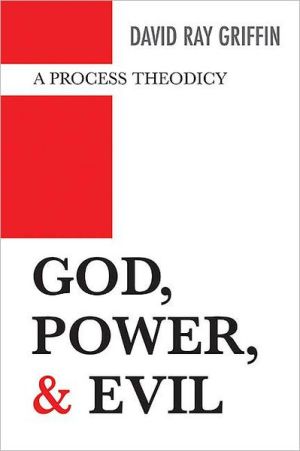

 |

|

The average rating for God, Power, and Evil: A Process Theodicy based on 2 reviews is 4.5 stars.
Review # 1 was written on 2012-05-26 00:00:00 Mark Pumel Mark PumelOne of he most influential books I read as an undergraduate. |
Review # 2 was written on 2012-05-31 00:00:00 Lilia Batista Lilia BatistaChapter 1: What is Everyday Theology Culture is a work and world of meaning (26). It is a work because it is the result of what humans do freely, not by nature. The products of such work are cultural texts (a text is intentional human action, a work that communicates meaning and calls for interpretation). Culture is a world in the sense that cultural texts create a meaningful environment in which humans dwell both physically and imaginatively (26). It is a lived worldview. Culture is both system and practice, a means through which visions of the meaning of life are expressed, experienced, and explored through cultural texts (27). Culture Communicates. Culture Orients. Culture Reproduces. Culture Cultivates (28ff). Christians must learn to read the Bible and culture alike (35). Is Cultural exegesis without theological presuppositions possible? (40). Four doctrines to keep in mind: Incarnation, General Revelation, Common Grace, Image of God. Good Calvin quote (Institutes 2.2.15): If we regard the Spirit of God as the sole fountain of truth, we shall neither reject the truth itself, nor despise it wherever it shall appear, unless we wish to dishonor the Spirit of God. Pages 44-54 kind of lost me. Methodological Coda: Guidelines for Everyday Theological Interpretation of Culture: 1. Try to comprehend a cultural text on its own terms before you "interpret" it. 2. Attend to what a cultural text is doing as well as saying by clarifying its illocutionary act. 3. Consider the world behind, of, and in front of the cultural text. 4. Determine what "powers" are served by particular cultural texts or trends by discovering whose material interests are served. 5. Seek the "world hypothesis" and/or "root metaphor" implied by a cultural text. 6. Be comprehensive in your interpretation of a cultural text; find corroborative evidence that makes best sense of the whole as well as the parts. 7. Give "thick" descriptions of the cultural text that are nonreductive and sensitive to the various levels of communicative action. 8. Articulate the way of being human to which a cultural text directly or indirectly bears witness and gives commendation. 9. Discern what faith a cultural text directly or indirectly expresses. To what convictions about God, the world, and ourselves does a cultural text and/or trend commit us? 10. Locate the cultural text in the biblical creation-fall-redemption schema and make sure that biblical rather than cultural texts have the lead role in shaping your imagination and hence your interpretative framework for your experience. |
CAN'T FIND WHAT YOU'RE LOOKING FOR? CLICK HERE!!!